Kaiyi Ji
DeepMTL2R: A Library for Deep Multi-task Learning to Rank
Feb 16, 2026Abstract:This paper presents DeepMTL2R, an open-source deep learning framework for Multi-task Learning to Rank (MTL2R), where multiple relevance criteria must be optimized simultaneously. DeepMTL2R integrates heterogeneous relevance signals into a unified, context-aware model by leveraging the self-attention mechanism of transformer architectures, enabling effective learning across diverse and potentially conflicting objectives. The framework includes 21 state-of-the-art multi-task learning algorithms and supports multi-objective optimization to identify Pareto-optimal ranking models. By capturing complex dependencies and long-range interactions among items and labels, DeepMTL2R provides a scalable and expressive solution for modern ranking systems and facilitates controlled comparisons across MTL strategies. We demonstrate its effectiveness on a publicly available dataset, report competitive performance, and visualize the resulting trade-offs among objectives. DeepMTL2R is available at \href{https://github.com/amazon-science/DeepMTL2R}{https://github.com/amazon-science/DeepMTL2R}.
Provable Effects of Data Replay in Continual Learning: A Feature Learning Perspective
Feb 02, 2026Abstract:Continual learning (CL) aims to train models on a sequence of tasks while retaining performance on previously learned ones. A core challenge in this setting is catastrophic forgetting, where new learning interferes with past knowledge. Among various mitigation strategies, data-replay methods, where past samples are periodically revisited, are considered simple yet effective, especially when memory constraints are relaxed. However, the theoretical effectiveness of full data replay, where all past data is accessible during training, remains largely unexplored. In this paper, we present a comprehensive theoretical framework for analyzing full data-replay training in continual learning from a feature learning perspective. Adopting a multi-view data model, we identify the signal-to-noise ratio (SNR) as a critical factor affecting forgetting. Focusing on task-incremental binary classification across $M$ tasks, our analysis verifies two key conclusions: (1) forgetting can still occur under full replay when the cumulative noise from later tasks dominates the signal from earlier ones; and (2) with sufficient signal accumulation, data replay can recover earlier tasks-even if their initial learning was poor. Notably, we uncover a novel insight into task ordering: prioritizing higher-signal tasks not only facilitates learning of lower-signal tasks but also helps prevent catastrophic forgetting. We validate our theoretical findings through synthetic and real-world experiments that visualize the interplay between signal learning and noise memorization across varying SNRs and task correlation regimes.
SAMO: A Lightweight Sharpness-Aware Approach for Multi-Task Optimization with Joint Global-Local Perturbation
Jul 10, 2025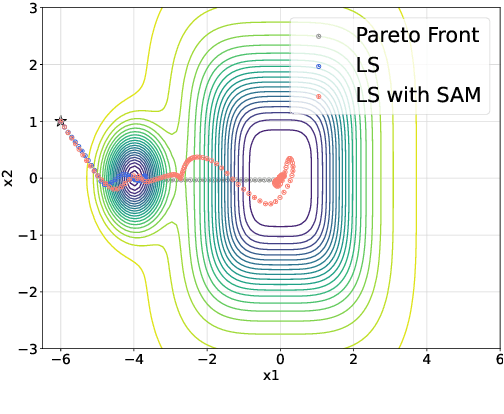

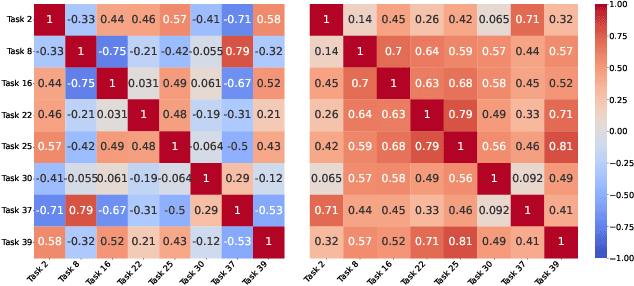
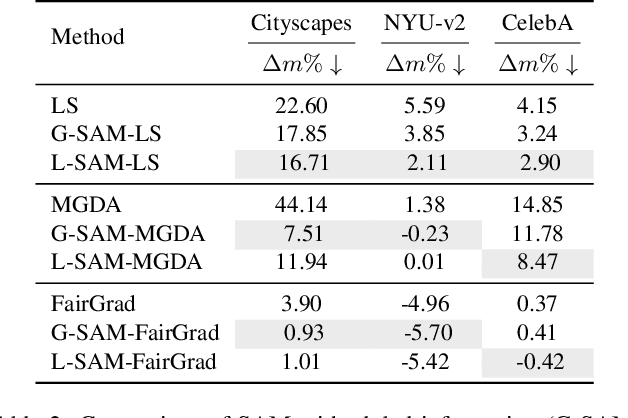
Abstract:Multi-task learning (MTL) enables a joint model to capture commonalities across multiple tasks, reducing computation costs and improving data efficiency. However, a major challenge in MTL optimization is task conflicts, where the task gradients differ in direction or magnitude, limiting model performance compared to single-task counterparts. Sharpness-aware minimization (SAM) minimizes task loss while simultaneously reducing the sharpness of the loss landscape. Our empirical observations show that SAM effectively mitigates task conflicts in MTL. Motivated by these findings, we explore integrating SAM into MTL but face two key challenges. While both the average loss gradient and individual task gradients-referred to as global and local information-contribute to SAM, how to combine them remains unclear. Moreover, directly computing each task gradient introduces significant computational and memory overheads. To address these challenges, we propose SAMO, a lightweight \textbf{S}harpness-\textbf{A}ware \textbf{M}ulti-task \textbf{O}ptimization approach, that leverages a joint global-local perturbation. The local perturbations are approximated using only forward passes and are layerwise normalized to improve efficiency. Extensive experiments on a suite of multi-task benchmarks demonstrate both the effectiveness and efficiency of our method. Code is available at https://github.com/OptMN-Lab/SAMO.
Scalable Bilevel Loss Balancing for Multi-Task Learning
Feb 12, 2025



Abstract:Multi-task learning (MTL) has been widely adopted for its ability to simultaneously learn multiple tasks. While existing gradient manipulation methods often yield more balanced solutions than simple scalarization-based approaches, they typically incur a significant computational overhead of $\mathcal{O}(K)$ in both time and memory, where $K$ is the number of tasks. In this paper, we propose BiLB4MTL, a simple and scalable loss balancing approach for MTL, formulated from a novel bilevel optimization perspective. Our method incorporates three key components: (i) an initial loss normalization, (ii) a bilevel loss-balancing formulation, and (iii) a scalable first-order algorithm that requires only $\mathcal{O}(1)$ time and memory. Theoretically, we prove that BiLB4MTL guarantees convergence not only to a stationary point of the bilevel loss balancing problem but also to an $\epsilon$-accurate Pareto stationary point for all $K$ loss functions under mild conditions. Extensive experiments on diverse multi-task datasets demonstrate that BiLB4MTL achieves state-of-the-art performance in both accuracy and efficiency. Code is available at https://github.com/OptMN-Lab/-BiLB4MTL.
ReGNet: Reciprocal Space-Aware Long-Range Modeling and Multi-Property Prediction for Crystals
Feb 04, 2025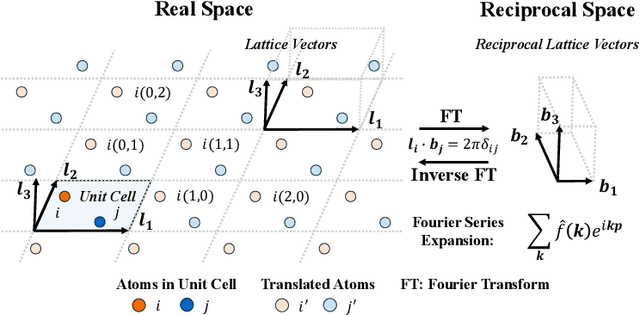
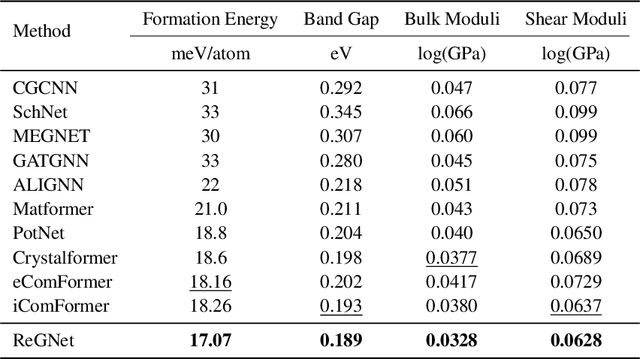
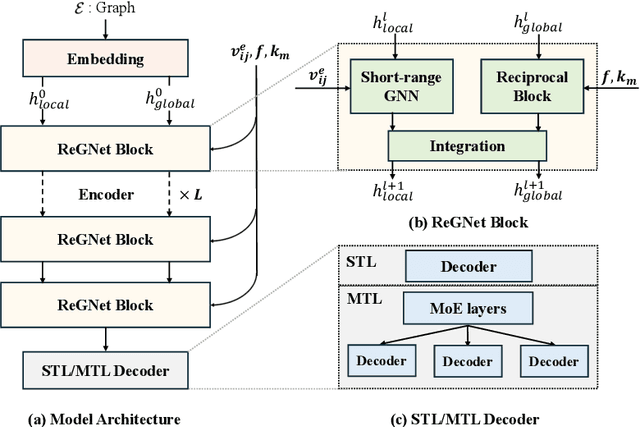
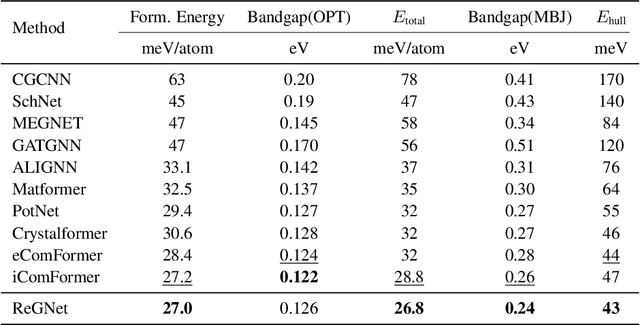
Abstract:Predicting properties of crystals from their structures is a fundamental yet challenging task in materials science. Unlike molecules, crystal structures exhibit infinite periodic arrangements of atoms, requiring methods capable of capturing both local and global information effectively. However, most current works fall short of capturing long-range interactions within periodic structures. To address this limitation, we leverage reciprocal space to efficiently encode long-range interactions with learnable filters within Fourier transforms. We introduce Reciprocal Geometry Network (ReGNet), a novel architecture that integrates geometric GNNs and reciprocal blocks to model short-range and long-range interactions, respectively. Additionally, we introduce ReGNet-MT, a multi-task extension that employs mixture of experts (MoE) for multi-property prediction. Experimental results on the JARVIS and Materials Project benchmarks demonstrate that ReGNet achieves significant performance improvements. Moreover, ReGNet-MT attains state-of-the-art results on two bandgap properties due to positive transfer, while maintaining high computational efficiency. These findings highlight the potential of our model as a scalable and accurate solution for crystal property prediction. The code will be released upon paper acceptance.
Enhancing Diffusion Posterior Sampling for Inverse Problems by Integrating Crafted Measurements
Nov 15, 2024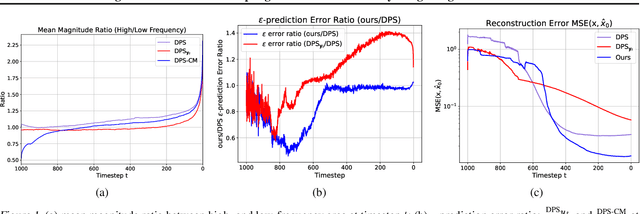



Abstract:Diffusion models have emerged as a powerful foundation model for visual generation. With an appropriate sampling process, it can effectively serve as a generative prior to solve general inverse problems. Current posterior sampling based methods take the measurement (i.e., degraded image sample) into the posterior sampling to infer the distribution of the target data (i.e., clean image sample). However, in this manner, we show that high-frequency information can be prematurely introduced during the early stages, which could induce larger posterior estimate errors during the restoration sampling. To address this issue, we first reveal that forming the log posterior gradient with the noisy measurement ( i.e., samples from a diffusion forward process) instead of the clean one can benefit the reverse process. Consequently, we propose a novel diffusion posterior sampling method DPS-CM, which incorporates a Crafted Measurement (i.e., samples generated by a reverse denoising process, compared to random sampling with noise in standard methods) to form the posterior estimate. This integration aims to mitigate the misalignment with the diffusion prior caused by cumulative posterior estimate errors. Experimental results demonstrate that our approach significantly improves the overall capacity to solve general and noisy inverse problems, such as Gaussian deblurring, super-resolution, inpainting, nonlinear deblurring, and tasks with Poisson noise, relative to existing approaches.
Meta-Learning with Heterogeneous Tasks
Oct 24, 2024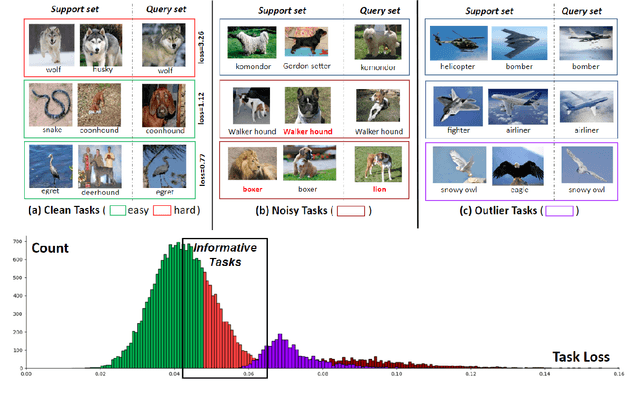
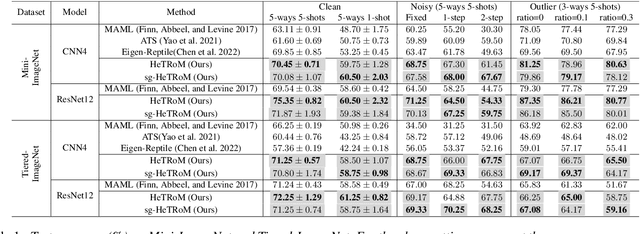


Abstract:Meta-learning is a general approach to equip machine learning models with the ability to handle few-shot scenarios when dealing with many tasks. Most existing meta-learning methods work based on the assumption that all tasks are of equal importance. However, real-world applications often present heterogeneous tasks characterized by varying difficulty levels, noise in training samples, or being distinctively different from most other tasks. In this paper, we introduce a novel meta-learning method designed to effectively manage such heterogeneous tasks by employing rank-based task-level learning objectives, Heterogeneous Tasks Robust Meta-learning (HeTRoM). HeTRoM is proficient in handling heterogeneous tasks, and it prevents easy tasks from overwhelming the meta-learner. The approach allows for an efficient iterative optimization algorithm based on bi-level optimization, which is then improved by integrating statistical guidance. Our experimental results demonstrate that our method provides flexibility, enabling users to adapt to diverse task settings and enhancing the meta-learner's overall performance.
Tuning-Free Bilevel Optimization: New Algorithms and Convergence Analysis
Oct 07, 2024



Abstract:Bilevel optimization has recently attracted considerable attention due to its abundant applications in machine learning problems. However, existing methods rely on prior knowledge of problem parameters to determine stepsizes, resulting in significant effort in tuning stepsizes when these parameters are unknown. In this paper, we propose two novel tuning-free algorithms, D-TFBO and S-TFBO. D-TFBO employs a double-loop structure with stepsizes adaptively adjusted by the "inverse of cumulative gradient norms" strategy. S-TFBO features a simpler fully single-loop structure that updates three variables simultaneously with a theory-motivated joint design of adaptive stepsizes for all variables. We provide a comprehensive convergence analysis for both algorithms and show that D-TFBO and S-TFBO respectively require $O(\frac{1}{\epsilon})$ and $O(\frac{1}{\epsilon}\log^4(\frac{1}{\epsilon}))$ iterations to find an $\epsilon$-accurate stationary point, (nearly) matching their well-tuned counterparts using the information of problem parameters. Experiments on various problems show that our methods achieve performance comparable to existing well-tuned approaches, while being more robust to the selection of initial stepsizes. To the best of our knowledge, our methods are the first to completely eliminate the need for stepsize tuning, while achieving theoretical guarantees.
Why Fine-Tuning Struggles with Forgetting in Machine Unlearning? Theoretical Insights and a Remedial Approach
Oct 04, 2024


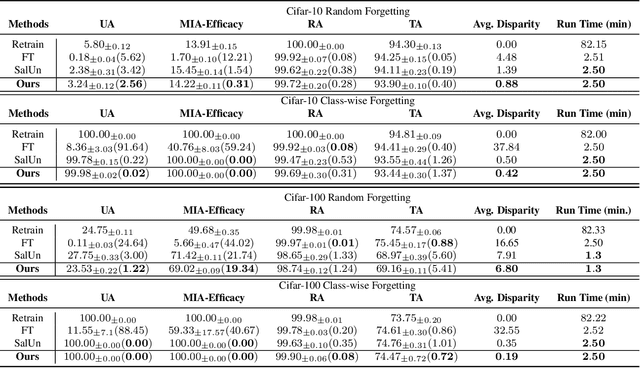
Abstract:Machine Unlearning has emerged as a significant area of research, focusing on 'removing' specific subsets of data from a trained model. Fine-tuning (FT) methods have become one of the fundamental approaches for approximating unlearning, as they effectively retain model performance. However, it is consistently observed that naive FT methods struggle to forget the targeted data. In this paper, we present the first theoretical analysis of FT methods for machine unlearning within a linear regression framework, providing a deeper exploration of this phenomenon. We investigate two scenarios with distinct features and overlapping features. Our findings reveal that FT models can achieve zero remaining loss yet fail to forget the forgetting data, unlike golden models (trained from scratch without the forgetting data). This analysis reveals that naive FT methods struggle with forgetting because the pretrained model retains information about the forgetting data, and the fine-tuning process has no impact on this retained information. To address this issue, we first propose a theoretical approach to mitigate the retention of forgetting data in the pretrained model. Our analysis shows that removing the forgetting data's influence allows FT models to match the performance of the golden model. Building on this insight, we introduce a discriminative regularization term to practically reduce the unlearning loss gap between the fine-tuned model and the golden model. Our experiments on both synthetic and real-world datasets validate these theoretical insights and demonstrate the effectiveness of the proposed regularization method.
Imperative Learning: A Self-supervised Neural-Symbolic Learning Framework for Robot Autonomy
Jun 23, 2024



Abstract:Data-driven methods such as reinforcement and imitation learning have achieved remarkable success in robot autonomy. However, their data-centric nature still hinders them from generalizing well to ever-changing environments. Moreover, collecting large datasets for robotic tasks is often impractical and expensive. To overcome these challenges, we introduce a new self-supervised neural-symbolic (NeSy) computational framework, imperative learning (IL), for robot autonomy, leveraging the generalization abilities of symbolic reasoning. The framework of IL consists of three primary components: a neural module, a reasoning engine, and a memory system. We formulate IL as a special bilevel optimization (BLO), which enables reciprocal learning over the three modules. This overcomes the label-intensive obstacles associated with data-driven approaches and takes advantage of symbolic reasoning concerning logical reasoning, physical principles, geometric analysis, etc. We discuss several optimization techniques for IL and verify their effectiveness in five distinct robot autonomy tasks including path planning, rule induction, optimal control, visual odometry, and multi-robot routing. Through various experiments, we show that IL can significantly enhance robot autonomy capabilities and we anticipate that it will catalyze further research across diverse domains.
 Add to Chrome
Add to Chrome Add to Firefox
Add to Firefox Add to Edge
Add to Edge